Christian History
Ecclesia, Government, & Early America

Christian History
“My people are destroyed for lack of knowledge.”
Hosea 4:6
The Greek the word for “church” is “ecclesia”. Where did this word originate?
Does a building where Christians meet do justice to the word? No.
How about a called-out assembly of Christians—meaning the Christians themselves meeting in those church buildings? Better.
But this still falls far short of ecclesia‘s full intent for its original meaning. Christians assembling together to do only what they do today (when biblical) represents a fraction of this word’s intent.
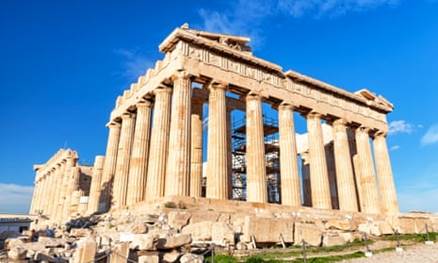
Ecclesia was first and foremost a political term.
Consider what even the Encyclopedia Britannica’s definition of ecclesia:
An ancient Greek assembly (“gathering of those summoned”), in ancient Greece, assembly of citizens in a city-state. … the Ecclesia … the body of male citizens 18 years of age or over and [who] had final control over policy, including the right to hear appeals in the heliaia (public court), take part in the election of archons (chief magistrates), and confer special privileges on individuals. … Assemblies of this sort existed in most Greek city-states, continuing to function throughout the Hellenistic and Romans periods, though under the Roman Empire their powers gradually atrophied
That the Greeks’ ecclesias were eventually eliminated under the Roman Empire should not come as surprise. Much like King James dictating to his translators to render ecclesia as church, the Roman dictators made sure they also had the monopoly on such political assemblies over the Greeks. The Romans further designed to do the same with anyone like the apostles in Acts 17:6-7 who were in the process of turning the Roman Empire upside down by declaring Christ as their King, His laws as supreme, and thereby doing “contrary to the decrees of Caesar.”
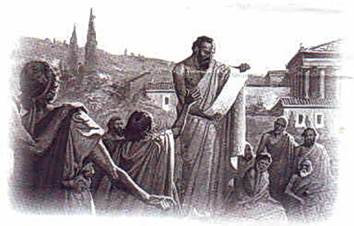
The Free Dictionary sums up ecclesia as “The political assembly of citizens of an ancient Greek state.” Does the New Testament bear out this definition? Acts 19:23-41:
23 About that time there arose a great disturbance about the Way. 24 A silversmith named Demetrius, who made silver shrines of Artemis, brought in a lot of business for the craftsmen there. 25 He called them together, along with the workers in related trades, and said: “You know, my friends, that we receive a good income from this business. 26 And you see and hear how this fellow Paul has convinced and led astray large numbers of people here in Ephesus and in practically the whole province of Asia. He says that gods made by human hands are no gods at all. 27 There is danger not only that our trade will lose its good name, but also that the temple of the great goddess Artemis will be discredited; and the goddess herself, who is worshiped throughout the province of Asia and the world, will be robbed of her divine majesty.”
28 When they heard this, they were furious and began shouting: “Great is Artemis of the Ephesians!” 29 Soon the whole city was in an uproar. The people seized Gaius and Aristarchus, Paul’s traveling companions from Macedonia, and all of them rushed into the theater together. 30 Paul wanted to appear before the crowd, but the disciples would not let him. 31 Even some of the officials of the province, friends of Paul, sent him a message begging him not to venture into the theater.
32 The assembly was in confusion: Some were shouting one thing, some another. Most of the people did not even know why they were there. 33 The Jews in the crowd pushed Alexander to the front, and they shouted instructions to him. He motioned for silence in order to make a defense before the people. 34 But when they realized he was a Jew, they all shouted in unison for about two hours: “Great is Artemis of the Ephesians!”
35 The city clerk quieted the crowd and said: “Fellow Ephesians, doesn’t all the world know that the city of Ephesus is the guardian of the temple of the great Artemis and of her image, which fell from heaven? 36 Therefore, since these facts are undeniable, you ought to calm down and not do anything rash. 37 You have brought these men here, though they have neither robbed temples nor blasphemed our goddess. 38 If, then, Demetrius and his fellow craftsmen have a grievance against anybody, the courts are open and there are proconsuls. They can press charges. 39 If there is anything further you want to bring up, it must be settled in a legal assembly. 40 As it is, we are in danger of being charged with rioting because of what happened today. In that case we would not be able to account for this commotion, since there is no reason for it.” 41 After he had said this, he dismissed the assembly.
The Greek word for church, ecclesia, found three times in this scripture as “assembly”, has nothing to do with either church a building or American church as usually understood. Here the word church or “assembly,” is used in a legal political context – a political gathering conducted by the town clerk for the purpose of litigating a legal issue against Paul’s companions. We know N.T. church is more than a political arm for establishing God’s moral Law today in society “here on earth as it is in heaven.” But to say that it should “be the salt of the earth” except that the earth where government resides or “be the light the world” except the political world, surely misses 1st century Christendom. Moreover, ecclesia (church) as God’s moral political mission, should not be an issue with committed Christians wanting to be – “the salt of the earth… the light of the world… ambassadors… royal priests… of the King of kings… to seek (advance) first His kingdom… here on earth as it is in heaven”.
Otherwise, we’re like “the church in Laodicean… I know all the things you do, that you are neither hot nor cold. I wish that you were one or the other! But since you are like lukewarm water, neither hot nor cold, I will spit you out of my mouth! You say, ‘I am rich. I have everything I want. I don’t need a thing!’ And you don’t realize that you are wretched and miserable and poor and blind and naked” (Rev. 3:14ff).
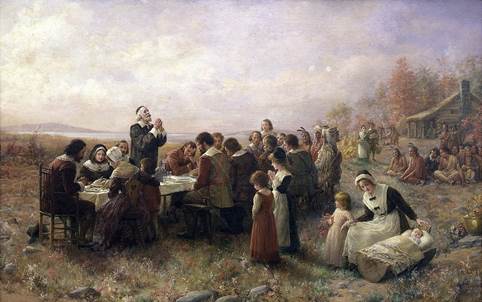
When the Mayflower landed on these shores half of all that landed died the first winter, being determined “to establish a new Israel.” Christendom’s early 1600s Christians were dominionizers on behalf of their King. They carried out the full mission of ecclesias, which included civil governments of, by, and for God, based upon His moral Law. The Christians of today’s churchianity are dominated, subjugated, and imprisoned within four-walled buildings—being careful not to say anything that would offend anyone, especially the god of the state so not to lose their 501(c)(3) non-profit. By the way, there were no “church” buildings for the first 300 years when Christianity virtually took over the Roman empire.
Not just the first Pilgrims but virtually most all early American’s were committed to the Bible being the rule of all law and were determined to establish church for worship of their King of kings, instruction for Christian family living, and finally, establishing God’s moral civil Law in ALL their cities.
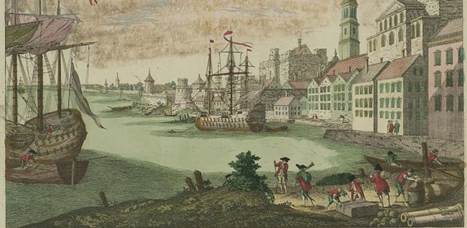
The Portsmouth, Rhode Island, Compact, 1638:
We whose names are underwritten do hereby solemnly in the presence of Jehovah incorporate ourselves into a Bodie Politick and as He shall help, will submit our persons, lives and estates unto our Lord Jesus Christ, the King of Kings, and Lord of Lords, and to all those perfect and most absolute laws of His given in His Holy Word of truth, to be guided and judged thereby.
Fundamental Agreement of the Colony of New Haven, Connecticut, 1639:
Agreement; We all agree that the scriptures hold forth a perfect rule for the direction and government of all men in duties which they are to perform to God and to man, as well in families and commonwealth as in matters of the church; so likewise in all public officers which concern civil order, as choice of magistrates and officers, making and repealing laws, dividing allotments of inheritance, and all things of like nature, we will, all of us, be ordered by the rules which the scripture holds forth; and we agree that such persons may be entrusted with such matters of government as are described in Exodus 18:21 and Deuteronomy 1:13 with Deuteronomy 17:15 and 1 Corinthians 6:1, 6 & 7.
The code of laws by the State of Connecticut in 1650:
Amongst these documents we shall notice, as especially characteristic the legislators of Connecticut begin with the penal laws, and they borrow their provisions from the text of Holy Writ. ‘Whosoever shall worship any other God than the Lord,’ says the preamble of the Code, ‘shall surely be put to death.’ This is followed by ten or twelve enactments of the same kind, copied verbatim from the books of Exodus, Leviticus, and Deuteronomy: Blasphemy, sorcery, adultery, and rape, punishable by death.

Alexis de Tocqueville, Democracy in America, 1835:
They [the Puritans] exercised the rights of sovereignty; they named their magistrates, concluded peace or declared war, made police regulations, and enacted laws as if their allegiance was due only to God. Nothing can be more curious and, at the same time more instructive, than the legislation of that period; it is there that the solution of the great social problem which the United States now presents to the world is to be found [in perfect fulfillment of Deuteronomy 4:5-8, demonstrating the continuing veracity of God’s Law and its accompanying blessings, per Deuteronomy 28:1-14].
I sought for the greatness and genius of America in her commodious harbors and her ample rivers—and it was not there … in her fertile fields and boundless forests and it was not there … in her rich mines and vast world commerce—and it was not there … in her democratic Congress and her matchless Constitution—and it was not there. Not until I went into the churches of America and heard her pulpits aflame with righteousness did I understand the secret of her genius and power. America is great because she is good, and if America ever ceases to be good, she will cease to be great.”
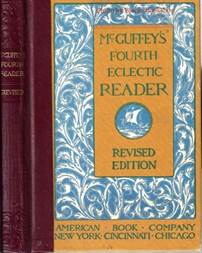
McGuffey’s Eclectic Reader (America’s most popular schoolbook in the 1800s) also testified to America’s early form of theocratic government:
The Puritan’s form of government was as strictly theocratical insomuch that it would be difficult to say where there was any civil authority among them distinct from ecclesiastical jurisdiction. Wherever a few of them settled a town, they immediately gathered themselves into a church [building]; and their elders were magistrates, and their code of laws was the Pentateuch [the first five books of the Bible]…. God was their King; and they regarded him as truly and literally so.
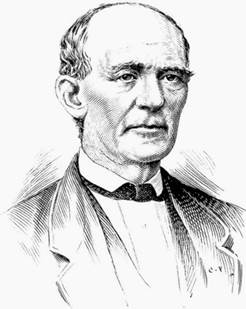
William Holmes McGuffey was undoubtedly influenced by the writings of early American preachers such as John Cotton. The renowned John Cotton—the first minister of Boston—earnestly pleaded that our “government might be considered a theocracy, wherein the Lord was Judge, Lawgiver and King that the laws which He gave Israel might be adopted” (as recorded in The History of New-Hampshire, 1862). John Cotton was quoting from Isaiah 33:22: “For the Lord is our judge, the Lord is our lawgiver, the Lord is our king.”

No wonder England’s King James gave special instructions to the King James Bible translators to render the Greek word ecclesia as church instead of a word that would have depicted its full intent, and which would in all likelihood be as much a threat to King James’s regime as it was to Caesar’s, and as it would to every regime today which is treasonous to their “King of kings” of every nation.
“And Jason has welcomed them (the apostles) into his home. They are all guilty of treason against Caesar, for they profess allegiance to another king, named Jesus”
(Acts 17:7NLT).
Related to this subject, Jim’s book – Christian Manifesto (Vol. 1) at: www.JimsBookstore.com
[This blog is free to share if forwarded in its entirety.]